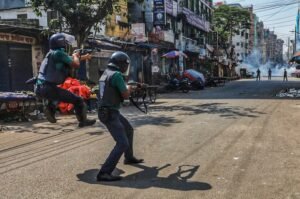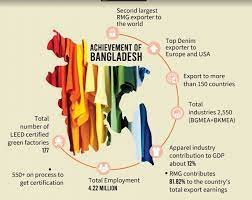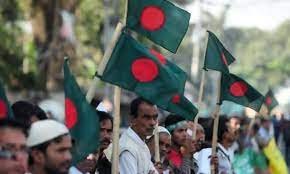Protests By The Workers
Bangladesh is one of the biggest manufacturers of clothing in the world; the $55 billion in yearly exports from the South Asian nation comes mainly from this industry.
Around 3,500 garment factories in Bangladesh produce clothing for some of the biggest brands and stores in the world, yet the minimum pay for employees is only 8,300 taka ($75) per month.
Thousands of garment industry workers staged protests in the streets of Gazipur, an industrial area, and Dhaka, the capital of Bangladesh, demanding better wages.
After the BGMEA (Bangladesh Garment Manufacturers and Exporters Association) proposed raising the minimum wage by 25% to $90 per month, rather than the $208 that the workers had sought, protests broke out over the weekend.
Thousands of protesters were in the streets of the Gazipur neighborhood, which is home to thousands of factories, and some of them were hurling stones at shops.

Hundreds of protesters chanted for higher wages in the Mirpur neighborhood of Dhaka. Some people were seen damaging vehicles. Protesters chanted slogans while security guards marched around the area.
“Our wages won’t need to be hiked if you reduce the price of (essential) goods,”. Lamenting the ongoing price increases. What is the price of starting a family, do you know? We have to spend more if there are infants,” an employee remarked.
The workers vandalized many stores, a medical facility, and an electric products showroom in addition to setting fire to them. In Gazipur, some workers stopped highways, set fire to various factories, and destroyed them, according to accounts in the local media. Two workers also died in the protests with the police.
In order for better wages, uniformed garment workers in Dhaka are expected to carry on with their indefinite strike and associated protest campaign at least through early November. More than 300 factories in Dhaka stopped operations as a result of the thousands of strike participants’ recent work stoppage and different forms of protests.
The offices of the Bangladesh Garment Manufacturers and Exporters Association (BGMEA), clothing factories, transport hubs, police stations, prominent government buildings, public squares, and thoroughfares are all possible locations for gatherings.
According to police, protesters had destroyed windows in buildings, set fire to tires, and blocked a major highway that connected the industrial region to the city, Dhaka.

In many industrial regions, especially in the areas of Abdullahpur, Ashulia, Gazipur, Mirpur, Rampura, Savar, and Tongi, authorities are keeping a heightened security presence. Depending on the perceived threat, officials may impose temporary limitations on public movement in addition to more security measures.
Bangladesh’s Garment Export Industry
Bangladesh exports clothing items worth approximately $55 billion a year, mostly to the US and Europe.
More than 3,000 factories in Bangladesh’s garment industry produce clothing for well-known Western labels like H&M, Levi and Gap Inc., accounting for more than 80% of the country’s exports.
The nation’s readymade garment industry, which is an essential part of Bangladesh’s economy, has been worried by political unrest and labor turmoil.
“As of right now, my two factories are closed; they are situated in Ashulia and Gazipur. The disturbance in production prevents me from producing clothing on time. Furthermore, items cannot be shipped to the port for export because political parties have called for a national blockade, according to Knit Asia Limited managing director A. Matin Chowdhury.
“As a result, we might have to think about more expensive air shipping, cancel orders, or give customers discounts.”

The Bangladesh Garment Manufacturers and Exporters Association president, Faruque Hassan, reported that 50 additional facilities were closed on Thursday as a result of the worker’s walkout, increasing the total number of plant closures to approximately 500.
“We have requested that all manufacturing owners reopen on Saturday. According to Section 13 of the Labor Act, there will be a closure if there is still vandalism or if employees are not showing up for work, he stated.
The clause makes reference to a labor law provision that allows for unpaid industrial closures brought on by a “illegal strike.”
The state minister of labor and employment, Begum Monnujan Sufian, has deemed the factory owners’ proposal to be “unreasonable.”
According to the regulations, workers’ pay should have climbed to roughly 10,400 taka at a 5% yearly rate during the previous five years. Is this a proposal that is worthy? referring to the owners’ request, she informed reporters.
She warned that the BNP was instigating worker unrest and asked workers to return to their employment, promising that the government would shortly unveil “an acceptable” wage structure.
Political Tension in Bangladesh
The protests coincided with rising tensions over the upcoming general elections between the main opposition party, the Bangladesh Nationalist Party, led by former prime minister Khaleda Zia, and the ruling Awami League party, led by Prime Minister Sheikh Hasina.
In a letter to Prime Minister Sheikh Hasina last month, officials of fifteen international clothing brands pledged to implement “responsible purchasing practices” and urged her to take rising prices into account as well as provide for the fundamental necessities of workers when implementing salary increases.

The main opposition Bangladesh Nationalist Party (BNP), which has found new life, has stepped up its calls for Prime Minister Sheikh Hasina to step down.
A neutral interim administration is desired by the BNP and its supporters before to the general elections because they believe Ms. Hasina will prevent free and fair voting. This demand has been turned down by the Awami League-led administration.
Tens of thousands of people attended the BNP demonstration in the nation’s capital Dhaka, making it the largest gathering to take place there in the past ten years.
In Bangladesh, political turmoil is not unusual. Parties have demonstrated in the streets over the years to demand their demands, which has led to closures, violence, and fatalities.
The Awami League is halfway through its second decade in power and is running for a fourth consecutive five-year term, but in recent years, the political rift has grown and the resentment has increased. There seems to be little chance of discussion before the vote because the two major parties do not want to make compromises.












Comments 4